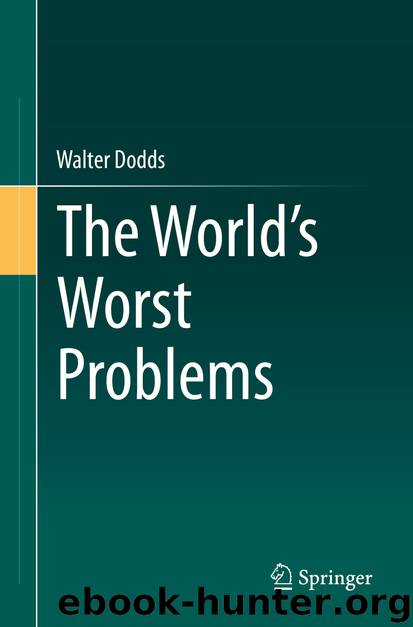The World’s Worst Problems by Walter Dodds

Author:Walter Dodds
Language: eng
Format: epub
ISBN: 9783030304102
Publisher: Springer International Publishing
Who Will Get Enough Water?
One out of eight people lack access to safe water. International disputes abound over water. Countries in dry areas are desperate for water to grow crops to feed their populations. These facts indicate how disproportionate the supply of clean water is around the world. Quality and quantity are both problems.
As I discussed previously, much water is too far away or comes in floods or quick snowmelt, and people simply cannot use it. Water is very heavy and costs a substantial amount of energy to move. Desalinating seawater is energy-intensive and a very expensive way to provide freshwater even when plenty of salt water is available. People already use half of the available water, and demand is increasing. The population is growing and using more water. Water pollution makes the water we have less useful and more expensive to use.
One of the large concerns is how changing climate will alter water availability. The warmer atmosphere will push more water into the atmosphere and lead to more precipitation worldwide. However, as heat increases, water evaporates more quickly as well, so it is not clear if plants (including crops) will benefit from the greater moisture in some areas.
Nearly 1/6 of the world’s people rely on water supplied by snowmelt from the Tibetan Plateau and other snowy mountains. As the glaciers and snowfields melt, there is less certainly about where water will come from in the summer. A warmer Earth will lead to more snowmelt runoff in the winter and early spring, shifting it from the summer when demand is greatest [91].
All these facts lead experts to predict that water is one of the key resources for humanity and one that is most likely to run out. As we run out, the chance for societal conflict increases, although this conflict is difficult to predict and related to complex factors [92]. As we push the limits of our ecological footprint on the planet, water is one of the resources most likely to show exactly where those limits lie.
Download
This site does not store any files on its server. We only index and link to content provided by other sites. Please contact the content providers to delete copyright contents if any and email us, we'll remove relevant links or contents immediately.
International Integration of the Brazilian Economy by Elias C. Grivoyannis(111059)
The Radium Girls by Kate Moore(12028)
Turbulence by E. J. Noyes(8049)
Nudge - Improving Decisions about Health, Wealth, and Happiness by Thaler Sunstein(7706)
The Black Swan by Nassim Nicholas Taleb(7129)
Rich Dad Poor Dad by Robert T. Kiyosaki(6632)
Pioneering Portfolio Management by David F. Swensen(6300)
Man-made Catastrophes and Risk Information Concealment by Dmitry Chernov & Didier Sornette(6019)
Zero to One by Peter Thiel(5801)
Secrecy World by Jake Bernstein(4753)
Millionaire: The Philanderer, Gambler, and Duelist Who Invented Modern Finance by Janet Gleeson(4478)
The Age of Surveillance Capitalism by Shoshana Zuboff(4292)
Skin in the Game by Nassim Nicholas Taleb(4248)
The Money Culture by Michael Lewis(4207)
Bullshit Jobs by David Graeber(4190)
Skin in the Game: Hidden Asymmetries in Daily Life by Nassim Nicholas Taleb(4006)
The Dhandho Investor by Mohnish Pabrai(3764)
The Wisdom of Finance by Mihir Desai(3746)
Blockchain Basics by Daniel Drescher(3582)
